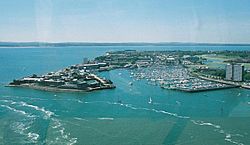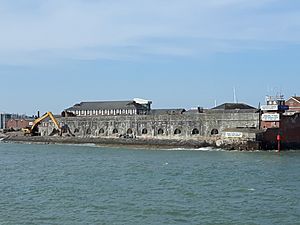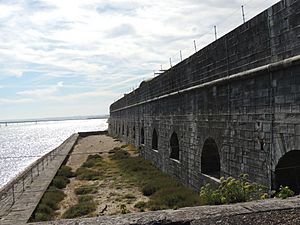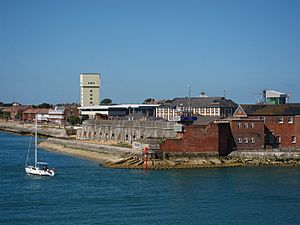Fort Blockhouse facts for kids
Quick facts for kids Fort Blockhouse |
|
|---|---|
| Gosport, England | |

Fort Blockhouse and the marina
|
|
| Lua error in Module:Location_map at line 420: attempt to index field 'wikibase' (a nil value). | |
| Type | Fort, later submarine base |
| Site information | |
| Condition | Complete |
| Site history | |
| Built | 1431, various additions until 1953 |
| In use | 1431–1539 (as blockhouse) 1539–1956 (as battery) 1905–1998 (as submarine base) 1998–2020 (as training site) |
| Battles/wars | Siege of Portsmouth (1642) |
Fort Blockhouse is an old military base in Gosport, Hampshire, England. It sits on a point of land, surrounded by water. This gives it a great view of the entrance to Portsmouth Harbour.
This fort is special for two reasons. First, it was built over many centuries. It started as a small tower in 1431. The last big addition was a submarine escape tower in 1953. Second, it is thought to be the oldest fort in the United Kingdom still used by the military. Even though it's not a coastal fort anymore, it's still used for medical and training purposes.
Contents
Fort Blockhouse: A Long History
Fort Blockhouse has been an important military site for a very long time. It has changed and grown over hundreds of years.
Early Defences (1431–1667)
In the 1400s, Portsmouth was attacked during the Hundred Years' War. To protect the harbour, a small tower called a blockhouse was built in Gosport in 1431. This was approved by King Henry VI.
A giant chain could be stretched from this blockhouse to a similar tower in Portsmouth. This chain would stop enemy ships from entering the harbour.
In 1539, Henry VIII ordered a new, bigger fort with eight guns. This happened after his divorce from Catherine of Aragon. Another fort, Haselworth Castle, was built nearby in 1545. But it was left empty after only eleven years.
In 1642, during the English Civil War, the fort was used to attack Portsmouth. Portsmouth was controlled by the King's supporters at that time.
Modern Fortifications (1667–1877)
The fort was greatly improved in 1667. Bernard de Gomme designed new defences for King Charles II. Two towers, James Fort and Charles Fort, were finished by 1679.
By the early 1700s, the defences were in poor shape. So, in 1708, the fort was completely rebuilt. It had 21 guns facing the sea. These 1708 parts are still visible today.
In 1757, the defences were made even bigger to protect a brewery. This brewery made beer for the navy. More changes happened between 1797 and 1803. This was because people worried about a French invasion. French prisoners of war even helped build parts of the new defences.
Many parts of Fort Blockhouse were updated in 1813. More changes to the gun battery happened in 1825 and 1845. However, some of the older forts nearby fell into ruin. By 1859, the defences were thought to be old-fashioned.
Submarine Base (1877–1998)
In 1877, Fort Blockhouse became a base for submarine mining. This meant they used underwater explosives to protect the harbour. New buildings, a crane, and a pier were added. A small railway was built to move explosives around.
In 1884, the School of Submarine Miners moved to the site. The pier was made longer in 1888. More rooms were added for storage and testing until 1891.
In 1905, the Royal Navy took over the fort. It became known as HMS Dolphin. This was the home of the Royal Navy Submarine Service. Old defences were removed to make transport easier.
The base grew outside the original fort area. In 1953, the tall submarine escape tower was built. It opened in 1954. This tower was needed for training after the submarine HMS Truculent sank in 1950. The fort's guns were removed in 1956.
In 1992, it was announced that the submarine fleet would leave HMS Dolphin. They moved to HMNB Devonport. The last submarine left in 1994. HMS Dolphin was officially closed in 1998.
Hospital and Training (1999–2020)
Even though the submarine base closed, the Royal Navy Submarine School stayed until 1999. Some training continued at Fort Blockhouse for another twenty years. The school later moved to HMS Raleigh in Cornwall.
The submarine escape tower was used until January 2020. Fort Blockhouse is still used today as a military field hospital. It is part of the 2nd Medical Brigade.
Future Plans
In 2016, the Ministry of Defence announced that Fort Blockhouse would be sold by 2020. This was part of a plan to reduce military property. Surveys were done in 2020 to see which buildings should be protected as listed buildings. The sale date has since been moved to at least 2023.
Images for kids
 | Aurelia Browder |
 | Nannie Helen Burroughs |
 | Michelle Alexander |





